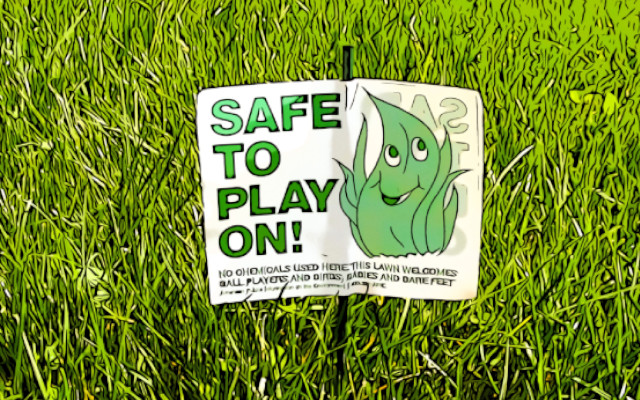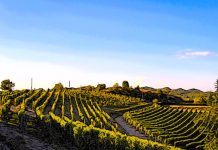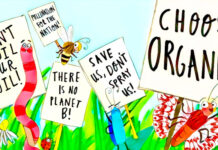On 26.2.19, the Chamber of Deputies voted unanimously on the united motion on ‘initiatives to ban the use of pesticides and herbicides in agricultural production, favoring their development by organic methods’. An early success for the #NoPesticides Facebook group, which we enthusiastically join, and for the coalition that supported it. A first step toward the civilization of agriculture in Italy? It is early to say, the battle must be carried on and followed closely.
Agrotoxics, everyone’s evil
Pesticides have catastrophic impacts On the ecosystem and those who inhabit it. Starting with bees and pollinating insects, forced to extinction due to seeds ‘tanned’ with neurotoxic neonicotinoids. (1) Farmers
are the first victims
of the harm caused to themselves and their children,
as well as those who live in or frequent places adjacent to the sprayed areas.
Environmental contamination multiplies the sources of intoxication, with effects persisting for several decades. The data ISPRA show the presence of pesticides in 33.5 percent of Italian groundwater and 67 percent of surface water. (2) With peaks, in some regions, of up to 90 percent. In fact, the drift effect, caused by the dispersion of poisons beyond the target crops and/or weeds, causes the poisons to spread over the natural resources essential to life (water and sludge, soils, air).
‘
From seed to fork’
, pesticide residues enter the human body through foods containing them. They have been found in hair tests, especially of younger people, as well as in the urine of some pregnant women. Human health is thus threatened by chronic exposure to hazardous substances with which cancer, neurodegenerative diseases (Alzheimer’s, Parkinson’s), endocrine interference, growth disorders, infertility. Neurological and neuromotor disorders, asthma and allergies, hypersensitivity, and rare diseases.
The costs outweigh the benefits, and by far, since every euro of value produced for the benefit of the individual farmer is matched by another euro in environmental costs alone (neglecting health costs). The difference being that the latter costs are outsourced at the expense of the community. (3)
‘
Global food production
threatens climate stability and ecosystem resilience and constitutes the single largest driver of environmental degradation and transgression of planetary boundaries.’ (4)
The real culprits
for this disaster are the giant ‘
Corporation
‘ that obtain approvals for the use of agrotoxics still based (when not literally copied
) on their own ‘custom-selected’ studies. The same industry groups also offer GMO seeds (or ‘new GMOs‘, NBT) specifically designed to withstand, they alone, increasing dosages of broad-spectrum poisons.
Agrochemical giants
deceive farmers with false promises of increased yields and lower tillage costs (when the exact opposite has been proven, on a thousand farms in neighboring France
). Effectively forcing them into increasing dependence on agrochemicals as their soils dry up and degrade. With the support of the large agricultural confederations, in blatant conflict of interest, and the guarantee of impunity grabbed through special clauses (e.g. #ISDS) in international treaties. The toxic treaties
That the political puppets of the ‘
Corporation
‘ carry out in undue representation of the populations.
No pesticides, the united motion
The united motion
to limit the use of pesticides was approved in the House of Representatives
By unanimous vote, 453 votes to 453. (5) The act was inspired by the #ChangeTheEarth campaign and the Facebook group ‘No Pesticides,’ whose petition collected nearly 30,000 signatures. (6) Members asked in unison to commit the government to:
– ‘
strengthen the system of controls
On theproper use of pesticides in agriculture, also increasing controls on agri-food products imported from third countries for which it can be demonstrated that they have been treated with glyphosate beyond the threshold allowed within the European framework, in order to protect the Italian production chain and ensure high quality standards,
– vigilance, to the extent of its competence, so that the Monitoring the level of pesticide contamination in water be uniform throughout the country and that all regions have a water protection plan to ensure a high level of protection of human, animal and environmental health,
–
provide for initiatives aimed at a more responsible use of plant protection products
because agriculture is a very important sector of the Italian economy and it is important that it can develop and continue to do so with a view to quality and safeguarding the health of both consumers and operators.’
Friend Renato Bottiglia, coordinator of the group, points out that ‘the whole Parliament agrees, now we await the “translation” into a legislative act. May this be the first concrete step towards a sustainable agriculture shared by all political forces?.’
No pesticides, the transformation needed
Sustainable agriculture and food are a pressing need. But more than 63 percent of arable land in Europe is used for crops for animal feed. (7) Thanks to EU funding, the livestock sector is tending toward an increasing concentration of production on larger and larger farms.
A paradigm shift is needed
, from quantity to quality, to nurture human health and protect the environment
.
Reduce food surplus and waste and improve agricultural practices in the direction of sustainability
. Without neglecting consumer education toward balanced diets that rely on the intake of healthy foods, for oneself and those around us.
One of the biggest challenges for humanity is to provide healthy, nutritious food for a growing world population through sustainable food systems. The goal of the ‘food security‘, that is, of the security of food supplies, includes the possibility for all human beings to access them adequately and consistently. Through proper diet, drinking water, toilets and health care. (8)
The unanimous vote on the motion ‘No pesticides’ is definitely a first step. Which will have to be translated into a legislative act without giving way to second-guessing in the name of under-the-table special interests. And it will benefit the entire population, if politics can free itself from the bad advice of lobbyists serving the ‘
Big 4
‘
, the seed and pesticide monopolists who dominate the global market.
Giulia Torre and Dario Dongo
Notes
(1) The following insecticide-based ‘tanning formulations’ are still authorized in Italy:
– Regent (active ingredient Fipronil
), for the ‘tanning’ of corn seed,
-Gaucho (p.a. Imidacloprid), on corn and sugar beet,
-Montur (p.a. Imidacloprid + Tefluthrin), sugar beet,
-Poncho (p.a. Clothianidin), corn,
-Cruiser (p.a. Thiamethoxam), corn, cotton, potato and sugar beet
(3) FAO (2015). ‘Natural Capital Impacts in Agriculture, Food and Agriculture Organization of the United Nations’, Rome.
(4) Willet et al. (2019). ‘Food in the Anthropocene: the EAT-Lancet Commission on healthy diets from sustainable food systems.’ The Lancet Commissions, 393(10170):447-492
(6)
https://secure.avaaz.org/it/community_petitions/petition_55b5ef34c8650/
(7) Greenpeace (2019). ‘Feeding the Problem, The dangerous intensification of animal farming in Europe‘, 19 February 2019.
(8) ‘Food security exists when all people, at all times, have physical and economic access to sufficient, safe and nutritious food that meets their dietary needs and food preferences for an active and healthy life’ (FAO)









